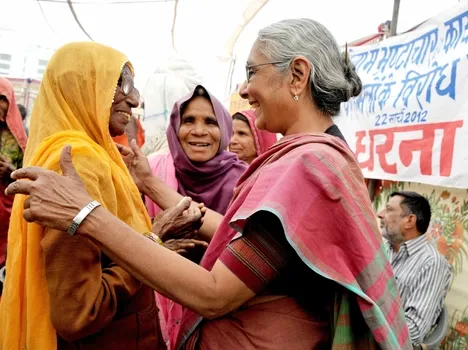Aruna Roy’s book published by HarperCollins under the title ‘The Personal is Political –An Activist’s Memoir’ has attracted a lot of attention within a short time, and for good reason. A part of the reason relates to what Amartya Sen and Jean Dreze say in their comment on the book, “Aruna Roy reflects on a life of deep engagement, weaving the personal and the political. A great inspiration.”
For most people Aruna Roy is a highly inspiring social activist who has been involved with some of the most successful social campaigns of India leading to the formulation of very important legislations that have impacted the life of millions of people in very positive ways (and can do so even more with better implementation of these laws).
However as Aruna Roy’s fellow-travelers and closest colleagues on the path of activism -- Shankar Singh and Nikhil Dey -- say in their afterword, to call Aruna just an ‘activist’ “would be to pigeonhole her in ways that are unfair to what she is : a person with such a wide array of interests, skills and knowledge that draws a natural and original continuum between the personal and the political; the private and the public; the internal and the external; the home and the world; the small and the big… It is Aruna’s careful attention to the smallest detail that prepares the ground for the big breakthroughs that we have been privileged to experience together.”
Nikhil Dey and Shankar Singh are themselves great activists with many-sided accomplishments, and this is what they have to say about this book: “This is a serious book, about serious issues, in serious times. Like Aruna, it does not shy away from raising uncomfortable questions, facing them squarely and understanding that answers are nuanced with shades of grey. That’s what makes the book even more interesting and valuable.”
We may add here that while this book certainly deals with very serious issues in serious ways, it is not without its share of very interesting, at times even funny anecdotes which enliven these pages.
This book moves at two levels. On the one hand we read about the experiences of Aruna Roy while resigning from a senior government job to work in a voluntary organization (the Barefoot College or SWRC) founded by her husband Bunker Roy at a very young age, followed by her experiences in a non-party political organization (MKSS) and then the School for Democracy.
This includes the very valuable experiences of the Right to Information, the Right to Work and the Right to Food movements. In addition we come to know about Aruna Roy’s important work on gender issues and the highly creative but lesser known crafts related work and other engagements with art and music.
On the other hand in this book we find Aruna Roy’s thoughtful comments on a wide array of issues that can range from oral history and literature to feminism and various aspects of democracy including decentralization.
A third and very interesting aspect relates to her description of and tributes to her colleagues, particularly women from poorer rural families, with whom she worked in several social movements and to some of whom she refers to as her mentors.
Here we may take a quick look at some brief extracts from what some eminent persons have stated about this book.
Annie Raja says, “The feminist character of the book is reflected in Aruna’s writing about the personal struggles that women have faced at different times in work in social movements.”
Kavita Srivastava says, “A must read for all those working with a perspective of strengthening processes and institutions for socio-economic justice of poor women.”
P Sainath writes, “This is a book that could probably only have been written by Aruna Roy. The simplicity and honesty of its expression actually walks us through what are truly complex issues.”
Syeda Hamid says, “ Seamlessly she narrates histories of movements and tehriks that give dignity and power to the marginalized who live in the villages of Rajasthan.”
Harsh Mander writes, “In these pages wisdom, political insights, grace, pique, humor and outrage all alternate to weave together a compelling, illuminating and engaging account of an extraordinary life of meaning.”
Jayati Ghosh writes, “It is a feminist tract, a deeply humanist tract –and a very engaging read.”
The book also has an important foreword written by Gopalkrishna Gandhi.
When I was covering the movements of MKSS in Rajasthan as a journalist, what I found particularly inspiring was the way in which the grassroots struggles were linked to national level initiatives. I wish Aruna Roy had written more about this. Also I would have liked very much to hear about what she has to say regarding some of the most serious threats at world level, about peace and war, about the many-sided environmental crisis and all that is together becoming the survival crisis, the most serious issue of our times.
While this needs to be resolved with the greatest urgency within a framework of justice and democracy, it is deeply troubling that the world leadership has been moving away from this. A very senior activist like Aruna Roy with her deep commitment to justice and democracy can contribute much in this context, and it would have been very useful to read her comments on such issues of urgency.
Finally, as Nikhil and Shankar have written their afterword in the book under the title ‘The Last Word’, let them have the last word in this review too: “We feel, quite strongly, that this is a book that will spread hope far beyond its own context and times.”
---
*Honorary convener, Campaign to Save Earth Now. Books: "Planet in Peril", "Protecting Earth for Children", "Man over Machine" and "A Day in 2071"



Comments